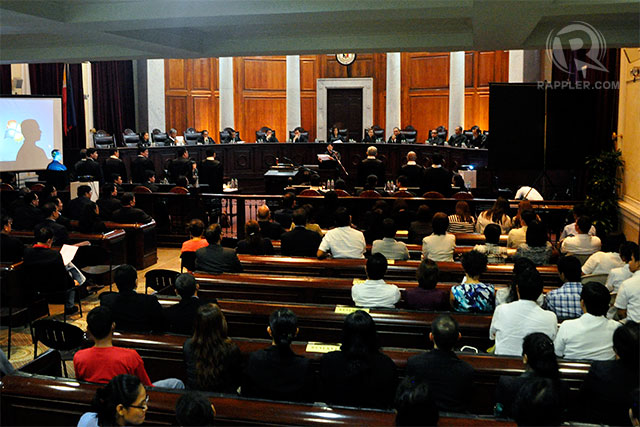SUMMARY
This is AI generated summarization, which may have errors. For context, always refer to the full article.

MANILA, Philippines – For 3 years now, the budget department under Secretary Florencio Abad has been realigning items in the budget without written consent from the President.
This was pointed out by Senior Justice Antonio Carpio on the first day of oral arguments on the constitutionality of the government’s pump-priming scheme, known as the Disbursement Acceleration Program (DAP), on Tuesday, November 19.
Carpio asked Bayan Muna Representative Carlos Zarate, one of the counsels for the petitioners: “In 2011, there was no written authorization for the DAP. But they said they realized savings, [so] DBM realigned. But we have not seen a prior approval of the President, correct?”
Carpio added: “They admit there was realignment in 2013, but there was no written directive from the President? So it’s worse?”
Zarate agreed. Petitioners argued that the DAP is unconstitutional. They cited the Constitution’s provision that “no law shall be passed authorizing any transfer of appropriations without the approval of Congress.”
Carpio said only the President has the power to realign savings, from one item to another within the same agency.
The fundamental law states: The President “may, by law, be authorized to augment any item in the general appropriations law for their respective offices from savings in other items of their respective appropriations.”
Carpio said DBM’s National Budget Circular No. 541, issued in 2012, validated or regularized what was done in 2011, when DAP was introduced.
NBC No. 541 allows DBM to withdraw “unobligated allotments” and use them to cover additional funding for existing projects and “augment existing programs and projects of any agency and to fund priority programs and projects not considered in the 2012 budget.”
Asked to define what unobligated allotments are, Zarate said these are those that have been approved for release but the appropriations were not awarded to a supplier.
The DAP was created by the executive branch in 2011 to boost spending and help uplift the economy.
Legal questions over DAP arose after Senator Jinggoy Estrada revealed in a Senate privilege speech that senators were given additional funds after they delivered what Malacañang wanted in May 2012: the conviction of former chief justice Renator Corona in the impeachment trial.
Budget Secretary Abad admitted additional funds were released to lawmakers in 2012 and early 2013, but said these were not bribes but rather a part of DAP. (READ: 2012 fund releases to pols not bribes – Abad)
Court can’t act as auditor
Meanwhile, some justices questioned whether the petition might be premature.
Associate Justice Marvic Leonen asked: Is it sufficient that there is a “facial challenge” against the government’s DAP or is there a need for specific acts under the controversial scheme that violates the Constitution?
A facial challenge is only allowed in terms of freedom of expression cases, Leonen said.
In presenting his petitioners’ case against the DAP, Zarate argued that a P264-million disbursement to the Office of the Presidential Adviser on the Peace Process for their PAMANA development project in December 2011 and a P3-billion allocation for the capital outlay of state universities and colleges were not included in the 2010 budget and were therefore illegal.
“It is not this court that should act as COA (Commission on Audit),” Leonen said. “Your allegations might be happening, we do not know. But in order for us to find out, we have to know the facts.”
The next oral arguments will be heard on December 10. – Rappler.com
Add a comment
How does this make you feel?
There are no comments yet. Add your comment to start the conversation.